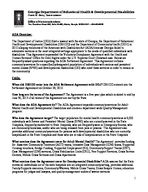Georgia Department of Behavioral Health & Developmental Disabilities
Frank W. Berry, Commissioner
Office of Communications
Two Peachtree Street NW, Suite 24-482, Atlanta, Georgia 30303-3142 ~ 404-463-8035
ADA Overview:
The Department of Justice (DOJ) filed a lawsuit with the state of Georgia, the Department of Behavioral Health and Developmental Disabilities (DBHDD) and the Department of Community Health (DCH) in 2010 alleging violations of the American with Disabilities Act (ADA) because Georgia failed to administer services in the most integrated settings appropriate to the needs of qualified individuals with disabilities. This Agreement superseded the Voluntary Compliance Agreement with the Health and Human Services' Office for Civil Rights under the U.S. Supreme Court Olmstead case. Below are frequently asked questions regarding the ADA Settlement Agreement. This Agreement outlines community services for a specifically designated population of individuals with serious and persistent mental illness (SPMI) and developmental disabilities (DD) who need these services in order to remain in the community.
FAQs:
When did DBHDD enter into the ADA Settlement Agreement with DOJ? DBHDD entered into the Settlement Agreement on October 29, 2010.
How long are the terms of the Agreement? The Agreement is a five-year plan which is slated to end by June 30, 2015 if all terms of the Agreement are met by the State.
What does the ADA Agreement do? The ADA Agreement expands community services for Adult Mental Health and Developmental Disabilities and creates a department-wide Quality Management program.
Who does the Agreement target? The target population for mental health community services is 9,000 individuals with Severe and Persistent Mental Illness (SPMI) who are currently served in the State Hospitals, frequently readmitted to State Hospitals, who are frequently seen in Emergency Rooms, who are chronically homeless, and/or who are being released from jails or prisons. The Agreement also provides additional community services for persons with developmental disabilities who are currently hospitalized in the State Hospitals and those who are at risk of hospitalization in the State Hospitals.
What services does the Agreement cover for Adult Mental Health? The Agreement provides funding for Assertive Community Treatment (ACT) teams, Intensive Case Management (ICM) teams, Supported Housing vouchers, Bridge Funding, Supported Employment (SE), Community Support Teams (CST), Case Management (CM) services, Crisis Stabilization Units (CSU), Peer Support Services, Crisis Service Centers, Mobile Crisis Services and Crisis Apartments.
What services does the Agreement cover for Developmental Disabilities? ADA assures that the State moves all individuals out of the state hospitals into an integrated community setting, provides additional Family Supports resources, Community Waivers, Mobile Crisis Teams, Crisis Respite Homes, education programs for judges and lawyers, and quality management audits of wavier services.
1
Why are individuals with Developmental Disabilities being transitioned from State Hospitals into the community? Title II of the Americans with Disabilities Act and other implementing regulations require that the State offers public services to qualified individuals with disabilities; such services shall be provided in the most integrated setting appropriate to meet the needs of such individuals. Community integration and self-determination must be honored to support individuals who are at risk of hospitalization. How many individuals with Developmental Disabilities does this affect? Under this Agreement, the State has set aside sufficient funds for at least 150 persons in State Hospitals with Developmental Disabilities to be transitioned to the community during each year of the Agreement. The total number of potential waivers over the course of the five-year Agreement is 750. Few, if any, individuals with Developmental Disabilities would remain hospitalized at the conclusion of the Agreement. Who ensures the terms of the Agreement are met? The Agreement provides for an Independent Reviewer appointed by the Court and approved by all parties involved. Each year the Independent Reviewer writes an annual report giving an overview of the Department's compliance. Where is the State in this Agreement? The State is currently in the third year of the five-year plan. DBHDD continues to dramatically expand its access to services in the community.
Revised 1/2013
